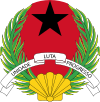Guinea-Bissau–Portugal relations
 | |
Guinea-Bissau |
Portugal |
|---|---|
Guinea-Bissau–Portugal relations refers to the bilateral relations between Guinea-Bissau and Portugal. Both nations are members of the Community of Portuguese Language Countries and the United Nations.
History
[edit]In 1446, the first Portuguese sailors arrived to what is now Guinea-Bissau searching for gold. The territory subsequently became administered as part of the Portuguese Cape Verde islands before being separated and called Portuguese Guinea.[1] Portuguese Guinea became an important post in the Atlantic slave trade, particularly to Brazil. In 1879, Guinea-Bissau becomes a separate colony within the Portuguese Empire.[1]
In 1956, Amílcar Cabral created the African Party for the Independence of Guinea and Cape Verde (PAIGC), fighting against colonialism and starting a march for independence. In 1963, the Guinea-Bissau War of Independence broke out lasting until 1974. The war ended when Portugal, after the Carnation Revolution of 1974, granted independence to Guinea-Bissau on 10 September 1974.[1]
Since independence, relations between Guinea-Bissau and Portugal have remained strong. There are many cultural similarities between both nations. There have also been several high-level visits between leaders of both nations and both countries work closely together within the Community of Portuguese Language Countries.
Transportation
[edit]There are direct flights between both nations with EuroAtlantic Airways and TAP Air Portugal.
Trade
[edit]In 2017, trade between both nations totaled €90 million Euros.[2] Portugal is one of Guinea-Bissau's largest trading partners.[2]
Resident diplomatic missions
[edit]- Guinea-Bissau has an embassy in Lisbon and a consulate-general in Albufeira.[3]
- Portugal has an embassy in Bissau.[4]
-
Embassy of Guinea-Bissau in Lisbon
-
Embassy of Portugal in Bissau
See also
[edit]References
[edit]- ^ a b c Guinea-Bissau country profile
- ^ a b Mercados Externos: Guiné-Bissau (in Portuguese)
- ^ Embassy of Guinea-Bissau in Lisbon
- ^ "Embassy of Portugal in Bissau". Archived from the original on 2020-10-09. Retrieved 2019-11-29.




